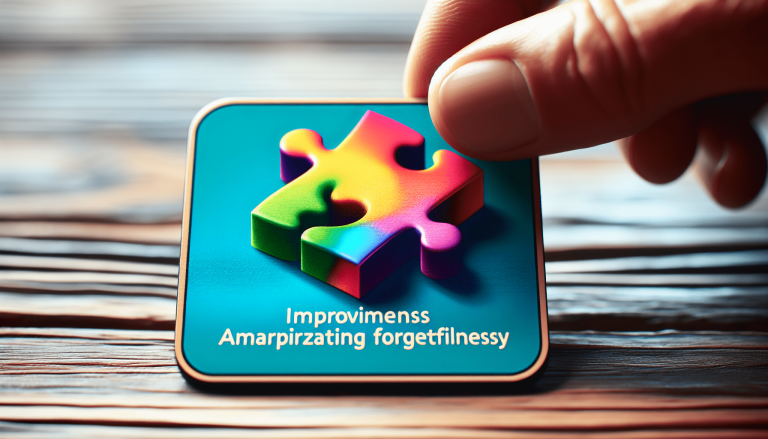Can I Train My Brain To Think Faster?
Have you ever wondered if it’s possible to train your brain to think faster? We all experience moments where our minds seem to be in slow motion, struggling to keep up with the demands of the world around us. But is it possible to boost our cognitive abilities and enhance our thinking speed? In this article, we’ll explore the exciting realm of neuroplasticity and discover how certain techniques and habits can potentially help us improve the speed at which we think, ultimately leading to greater efficiency and productivity in our daily lives. So, buckle up and get ready for a journey into the fascinating world of brain training!
What does it mean to think faster?
When we talk about thinking faster, we are referring to the speed at which our brain processes information, makes decisions, and adapts to different situations. It involves several cognitive abilities, including processing speed, cognitive flexibility, and the speed of decision-making.
Processing speed
Processing speed is the rate at which our brain processes information and completes mental tasks. It determines how quickly we can understand and respond to stimuli in our environment. People with a higher processing speed are able to think and react more quickly, allowing them to handle multiple tasks at once and make decisions in a timely manner.
Cognitive flexibility
Cognitive flexibility refers to our brain’s ability to switch between different thoughts, tasks, or perspectives. It involves adapting to new situations and changing our thinking strategies as needed. Having good cognitive flexibility allows us to think more creatively, solve problems efficiently, and effectively handle unexpected challenges.
Speed of decision-making
The speed of decision-making is the ability to make choices quickly and efficiently. It involves gathering and analyzing information, considering various options, and selecting the best course of action. Improved decision-making speed enables us to make timely and effective choices, both in everyday situations and more complex problem-solving scenarios.
Factors affecting thinking speed
Various factors can influence an individual’s thinking speed. These include genetics, age, health and lifestyle, as well as education and learning experiences.
Genetics
Genetics plays a role in determining our cognitive abilities, including thinking speed. Some people may naturally have faster processing speeds due to genetic factors. However, it’s important to note that genetics is just one aspect and doesn’t solely determine our thinking speed. Other factors can be modified to improve cognitive performance.
Age
As we age, our thinking speed tends to decline. It’s a natural process that occurs as brain processing slows down. However, engaging in activities that stimulate the brain can help slow down this decline. Regular mental exercises and brain-training activities can be beneficial in maintaining and even improving thinking speed as we get older.
Health and lifestyle
Our overall health and lifestyle choices can have a significant impact on thinking speed. A healthy lifestyle that includes regular exercise, proper nutrition, and sufficient sleep can positively influence cognitive function. On the other hand, unhealthy habits such as poor diet, lack of exercise, and chronic stress can impair cognitive performance and slow down thinking speed.
Education and learning
Education and learning experiences also contribute to thinking speed. Acquiring knowledge, engaging in challenging mental activities, and continuously learning new skills can help improve cognitive abilities. Education not only enhances thinking speed but also enhances cognitive flexibility, decision-making skills, and overall brain function.

Techniques to train your brain to think faster
Fortunately, there are several techniques and activities that can help train your brain to think faster.
Practice mindfulness
Mindfulness is the practice of being fully present in the moment and aware of your thoughts and emotions. Regular mindfulness practice has been shown to improve attention, focus, and overall cognitive function. By training your brain to be more present and focused, you can enhance your thinking speed.
Engage in regular physical exercise
Physical exercise not only benefits our physical health but also our brain function. Engaging in regular aerobic exercise can increase blood flow to the brain, improve oxygen supply, and enhance cognitive abilities. Aim for at least 150 minutes of moderate-intensity exercise per week to reap the brain-boosting benefits.
Improve your sleep quality
Sleep plays a crucial role in cognitive function, memory consolidation, and overall brain health. Prioritize getting enough quality sleep each night by establishing a consistent sleep schedule, creating a relaxing bedtime routine, and optimizing your sleep environment. Quality sleep improves alertness, attention, and thinking speed during the day.
Play brain-training games
Engaging in brain-training games and activities can help improve thinking speed. These games challenge your cognitive abilities, memory, and decision-making skills. There are various apps and online platforms available that offer brain-training exercises specifically designed to enhance cognitive performance. Regularly incorporating these games into your routine can have a positive impact on your thinking speed.
Learn a new skill or language
Learning a new skill or language stimulates different areas of the brain and promotes cognitive flexibility. It challenges your thinking patterns and expands your cognitive abilities. Whether it’s playing a musical instrument, painting, or learning a new language, these activities can enhance your brain’s ability to think faster and more efficiently.
Challenge your brain with puzzles and problem-solving
Engaging in puzzles, riddles, and problem-solving activities can be an enjoyable way to stimulate your brain and improve thinking speed. Sudoku, crossword puzzles, and logic games are great examples of activities that challenge your problem-solving skills and cognitive flexibility. Regularly incorporating these brain teasers into your routine can improve your overall cognitive abilities.
Practice speed reading
Speed reading involves increasing your reading speed without sacrificing comprehension. By improving your reading speed, you can process information more efficiently and think faster. Techniques like reducing subvocalization (pronouncing words in your mind) and using your peripheral vision can help improve reading speed. Regular practice can result in significant improvements in your reading and thinking speed.
Practice meditation
Meditation has been shown to improve focus, attention, and cognitive performance. Regular meditation practice can train your brain to be more focused and present, ultimately enhancing your thinking speed. Start with short meditation sessions and gradually increase the duration as you progress.
Break tasks into smaller parts
Breaking down complex tasks into smaller, manageable parts can improve your productivity and thinking speed. By focusing on one small task at a time, you can avoid feeling overwhelmed and enhance your ability to think and problem-solve more quickly.
Focus on one task at a time
Multitasking may seem like a time-saving strategy, but it can actually hinder your thinking speed and overall productivity. When you try to do multiple tasks simultaneously, your brain has to constantly switch its focus, leading to decreased efficiency and increased errors. Instead, focus on one task at a time and give it your full attention. This approach allows your brain to process information more thoroughly and think faster.
The role of diet in brain health and speed
What we eat can significantly impact our brain health and thinking speed. A healthy and balanced diet is essential for optimal cognitive function.
Eat a balanced diet
A balanced diet that includes a variety of nutrient-rich foods is crucial for brain health. Include a mix of whole grains, lean proteins, fruits, vegetables, and healthy fats in your diet. These foods provide essential nutrients, vitamins, and antioxidants that support brain function and enhance thinking speed.
Include brain-boosting foods
Certain foods have been linked to improved cognitive function and thinking speed. These include fatty fish (rich in omega-3 fatty acids), blueberries (high in antioxidants), turmeric (anti-inflammatory properties), dark chocolate (flavonoids), and nuts (high in antioxidants and healthy fats). Incorporating these brain-boosting foods into your diet can positively impact your thinking speed.
Stay hydrated
Dehydration can impair cognitive function and thinking speed. Make sure to drink enough water throughout the day to stay hydrated. Aim for at least eight glasses of water daily, and even more if you engage in physical exercise or live in a hot climate.
Limit sugar and processed foods
Excessive sugar intake and a diet high in processed foods have been associated with cognitive decline and slower thinking speed. Limiting your consumption of sugary drinks, sweets, and processed snacks can help maintain optimal brain health and enhance thinking speed.
Consider supplements
In some cases, certain supplements may be beneficial for brain health and thinking speed. Omega-3 fatty acids, vitamins B6, B12, and D, as well as antioxidants like vitamin E and C, have all been linked to improved cognitive function. However, it’s important to consult with a healthcare professional before starting any new supplements to ensure they are appropriate for you.

The importance of stress management
Stress can negatively impact our thinking speed and overall cognitive function. Implementing effective stress management strategies is crucial for optimal brain health and thinking speed.
Identify and manage stressors
Identifying the main sources of stress in your life can help you develop effective strategies for managing them. Whether it’s work-related stress, personal relationships, or financial worries, finding healthy outlets and coping mechanisms to deal with stress can greatly improve your thinking speed.
Practice relaxation techniques
Relaxation techniques like deep breathing exercises, progressive muscle relaxation, and guided imagery can help reduce stress and promote mental clarity. Regular practice of these techniques can help calm your mind, improve focus, and enhance thinking speed.
Take breaks and practice self-care
Frequent breaks throughout the day can prevent mental fatigue and improve thinking speed. Incorporate short breaks into your routine to rest and recharge. Engage in activities that bring you joy and relaxation, such as taking a walk, practicing hobbies, or spending time with loved ones. Prioritizing self-care can have a significant impact on your overall cognitive function and thinking speed.
Find healthy coping mechanisms
When faced with stress, it’s important to find healthy ways to cope and manage your emotions. Engage in activities such as exercise, meditation, journaling, or talking to a supportive friend or counselor. Avoid turning to unhealthy coping mechanisms like excessive alcohol consumption, substance abuse, or emotional eating, as these can further impair thinking speed and overall cognitive function.
The impact of technology on thinking speed
While technology has brought numerous benefits to our lives, it can also have a negative impact on our thinking speed if not used mindfully. Understanding the potential pitfalls and adopting healthy technology habits is essential for maintaining optimal cognitive function.
Digital distractions
Constant digital distractions can impair thinking speed and decrease productivity. Notifications, social media, and constantly checking emails can disrupt your focus and cognitive abilities. Practice setting dedicated time for technology use and limit distractions during important tasks to maintain your thinking speed.
Multitasking
Engaging in multiple tasks simultaneously, such as browsing the internet while working, can lead to decreased thinking speed and increased errors. Our brains are not wired to multitask effectively. Instead, focus on one task at a time and give it your full attention to enhance your thinking speed.

Information overload
The vast amount of information available through technology can overwhelm our brains and slow down thinking speed. Avoid falling into the trap of consuming excessive information without reflection. Be selective in what you engage with and take time to process and assimilate the information before moving on.
Use technology mindfully
Utilize technology mindfully to avoid its negative impact on thinking speed. Set boundaries for technology use, establish designated periods of uninterrupted focus, and be mindful of how technology affects your cognitive performance. By being intentionally aware of technology’s influence, you can maintain optimal thinking speed and cognitive function.
The benefits of physical activity on brain function
Physical activity is not just beneficial for our physical health, but also for our brain function. Regular exercise has been shown to improve memory, attention, and overall cognitive abilities, thus positively impacting thinking speed.
Increased blood flow and oxygen to the brain
Physical exercise increases blood flow to the brain, delivering essential oxygen and nutrients needed for optimal brain function. This increased blood flow promotes the growth and development of new brain cells and enhances neural connectivity, improving thinking speed.
Improved memory and cognitive function
Regular physical activity has been linked to improvements in memory and cognitive function. Exercise stimulates the production of growth factors that support the growth and maintenance of brain cells, enhancing memory recall and overall cognitive abilities. By improving these cognitive functions, thinking speed is also enhanced.
Reduced risk of cognitive decline
Engaging in regular physical activity throughout life has been associated with a reduced risk of cognitive decline and age-related cognitive impairments. Exercise helps preserve brain health by reducing inflammation, promoting neuroplasticity, and enhancing overall cognitive resilience. By reducing the risk of cognitive decline, regular physical activity supports optimal thinking speed throughout life.
How to improve focus and concentration
Maintaining focus and concentration is essential for thinking faster and completing tasks efficiently. There are several strategies and techniques that can help enhance your ability to concentrate and improve overall focus.
Eliminate distractions
Minimize distractions in your environment that may divert your attention and disrupt your focus. Find a quiet and well-organized workspace, and turn off notifications and alerts on your devices. By eliminating distractions, you can maintain a clear and focused mind, enabling faster thinking.
Break tasks into smaller chunks
Breaking down complex tasks into smaller, manageable chunks can make them more approachable and easier to focus on. Set specific goals for each smaller task, and concentrate on accomplishing them one at a time. By focusing on smaller parts, you can maintain an increased thinking speed and complete tasks more efficiently.
Create a conducive environment
Optimize your environment to promote focus and concentration. Find a comfortable space with adequate lighting and temperature. Remove clutter and organize your workspace to reduce visual distractions. Additionally, consider incorporating elements that enhance focus, such as calming music or a white noise machine.
Practice mindfulness and meditation
Mindfulness and meditation exercises can help train your mind to stay present and focused. Regular practice can improve attention span and enhance your ability to concentrate on tasks. By incorporating mindfulness and meditation into your routine, you can increase your thinking speed and overall cognitive performance.

Take regular breaks
While it may seem counterintuitive, taking regular breaks can actually improve your thinking speed and productivity. Our brains need periodic rest to recharge and maintain optimal performance. Schedule short breaks between tasks or set specific times for relaxation. Engaging in activities like stretching, deep breathing, or taking a short walk can help clear your mind and improve focus when you return to the task.
Manage your energy levels
Physical and mental fatigue can significantly impair thinking speed and focus. To maximize your cognitive abilities, it is important to manage your energy levels. Get enough quality sleep, eat nutritious meals, and engage in regular physical exercise to maintain optimal energy levels throughout the day. By managing your energy levels, you can enhance focus, concentration, and thinking speed.
The role of sleep in cognitive function
Sleep is an essential factor for optimal cognitive function and thinking speed. Getting enough quality sleep is crucial for maintaining mental clarity, attention, and overall brain health.
Get enough quality sleep
It is recommended that adults aim for 7-9 hours of quality sleep per night. While the exact sleep duration and requirements may vary for individuals, consistently getting enough sleep is vital for optimal cognitive performance. Lack of sleep can lead to impaired judgment, decreased attention span, and slower thinking speed.
Stick to a regular sleep schedule
Establishing a regular sleep schedule helps regulate your body’s internal clock and optimize sleep quality. Try to go to bed and wake up at the same time every day, even on weekends. Consistency in sleep routine promotes better sleep patterns, ensuring you are well-rested for optimal thinking speed.
Create a bedtime routine
Establishing a calming bedtime routine signals your body and mind that it’s time to wind down and prepare for sleep. engage in relaxing activities like reading, taking a warm bath, or practicing gentle stretching. Avoid stimulating activities or electronic devices close to bedtime, as these can interfere with sleep quality and impact thinking speed.
Improve sleep environment
Ensure your sleep environment is conducive to quality sleep. Keep your bedroom dark, quiet, and at a comfortable temperature. Invest in a supportive mattress and pillows that promote proper spinal alignment and reduce discomfort during sleep. By improving your sleep environment, you can enhance the quality of your sleep and promote overall cognitive function.
Limit caffeine and electronic devices before bed
Caffeine is a stimulant that can interfere with sleep. Avoid consuming caffeine in the afternoon and evening. Additionally, the blue light emitted by electronic devices can disrupt the production of sleep-inducing hormones. Limit exposure to electronic devices, such as smartphones, tablets, and laptops, at least one hour before bedtime to ensure better sleep quality and optimal thinking speed.
Seeking professional help
In some cases, seeking professional help may be necessary to further enhance cognitive performance and thinking speed. Consultation with a healthcare professional can provide insights and guidance tailored to your individual needs.
Consult a healthcare professional
If you are concerned about your thinking speed or cognitive abilities, it is recommended to consult a healthcare professional. They can conduct assessments, evaluate potential underlying causes, and provide appropriate recommendations or referrals. A healthcare professional may offer insights into personalized techniques or interventions to further enhance your thinking speed.
Consider cognitive training programs
Cognitive training programs, such as computer-based brain training exercises or personalized cognitive training programs, can be beneficial in improving thinking speed. These programs target specific cognitive domains and provide structured exercises and activities to enhance cognitive abilities. Consider exploring evidence-based cognitive training programs under the guidance of a healthcare professional.
Explore cognitive enhancement techniques
In some cases, individuals may explore cognitive enhancement techniques to further improve thinking speed. These techniques, such as neurofeedback, brain stimulation, or cognitive-enhancing medications, should be approached under the guidance and supervision of healthcare professionals who specialize in cognitive enhancement. It is important to have a thorough understanding of potential risks, benefits, and ethical considerations before pursuing these techniques.
In conclusion, thinking faster is a desirable ability that can be enhanced through various techniques and lifestyle adjustments. From practicing mindfulness and engaging in regular physical exercise to maintaining a balanced diet and managing stress, there are numerous strategies to boost your thinking speed. By adopting healthy habits and seeking professional help if needed, you can maximize your cognitive abilities and enjoy the benefits of a faster-thinking brain.
Additional Resources

You may be skyrocketing your risk of dementia…and that’s why you need to know how easily you can reverse your brain function.
This amazing breakthrough is designed to repair mental acuity and give anyone who uses it the best mental alertness with improved memory and focus in no time.
Find out for yourself now…
Fortunately, your brain cells can regenerate if you use this unprecedented method…







